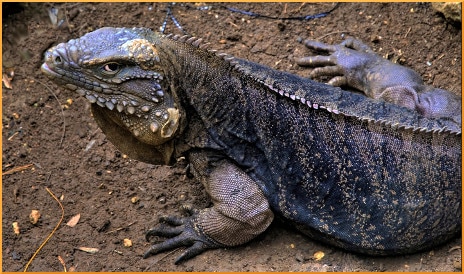
Not surprisingly, Dr. Pretlow is interested in which methods and programs lead to successful outcomes for addicts of all kinds. Childhood Obesity News has often discussed the question of whether obesity is generally caused by a substance addiction, or a behavioral addiction, in which case the addictor would be the act of eating, rather than the food itself.
Hedonic eating is a quick, cheap fix. Hyperpalatable food is almost universally available, certainly in America, and now in most of the world, even where plumbing and other amenities haven’t arrived. Just to complicate matters, a person could have both kinds of addiction at once; or start out with an ungovernable passion for certain foods, which then morphs into an inability to stop eating no matter what the food is.
In “The Lizard Brain Addiction Monster,” secular, grassroots recovery specialist (and former addict) John McC, also known as A. Orange, says:
Base brain is the back, lower part of the brain that attaches directly to the spinal cord… the oldest and most primitive part of the brain… “Lizard brain” is a popular slang term for that old brain.
The lizard brain doesn’t seem to differentiate between substance and behavior. It wants what it wants, and right now. To call the primitive lizard brain “unsophisticated” would be a compliment. It has no concept of delayed gratification, or of working toward the greater good of the organism it is part of.
It is widely accepted that all addiction comes from the same place, and indeed, people who banish one addictor from their lives often fall under the spell of another. A person who appears to be in recovery from alcohol might have just switched to gambling, pornography, food, or anything else that temporarily banishes physical discomfort or mental malaise . As John McC says:
The alcoholics and the junkies have no monopoly on the kind of stupidity that makes people continue to feed an addiction even while it is killing them.
The roots of addiction are deep, and one of them is the simple wish to feel good, or even just normal. The author reminds us:
It isn’t bad to want to feel good. It isn’t wrong to want to get high. We need to get high. We have a real genuine need to get high, just as real as our need for food. If we don’t, or can’t, get high, we go into depression. It is, sadly, just very harmful to our bodies to use chemicals to change how we feel, to get high… And it is sad to keep trying the same old thing, again and again, like playing some old worn-out broken record, when it isn’t getting us high any more.
If only it worked, many people would be willing to pay the price. But eventually, a person develops a tolerance to any painkiller. Because the lizard brain is a really slow learner, and stubborn once it gets its claws on an idea. It holds onto a notion, like “Oxygen is good,” so hard that it even keeps us breathing while we are asleep and not thinking about oxygen at all. We are lucky that it does those automatic functions so well.
But we can’t let it forge ahead with automatically doing everything it likes. Sometimes we have to overrule the lizard brain, like when it convinces us to crave things that don’t even make us feel good any more. At most, continued use can help avoid the pain of withdrawal. The lizard brain tricks us into paying the many prices of obesity without even getting the alleged rewards. What a con game!
John McC gives an insight into the “rock bottom” theory of quitting addiction:
The only time that base brain is a big help in breaking habits and escaping from addictions is when strong negative feelings have built up, like from getting really sick, being seriously ill and in great pain, nearly dying… Otherwise, base brain is all too likely to forget the pain, and just remember the pleasure.
Your responses and feedback are welcome!
Source: “The Lizard Brain Addiction Monster,” orange-papers.org, undated
Image by Berit Watkin

 FAQs and Media Requests:
FAQs and Media Requests: 











